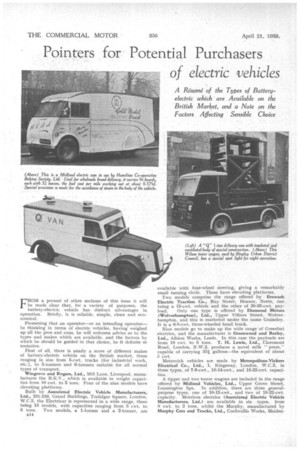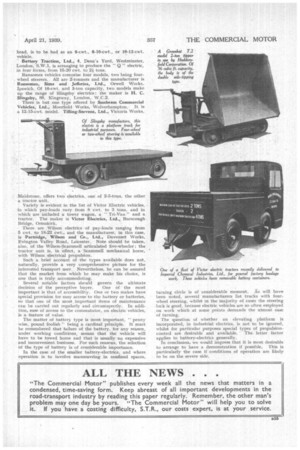Pointers for Potential Purchasers of electric vehicles
Page 50

Page 51

If you've noticed an error in this article please click here to report it so we can fix it.
FROM a perusal of other sections of this issue it will be made clear that, for a variety of purposes, the battery-electric, vehicle has distinct advantages in operation. Briefly, it is reliable, simple, clean and economical.
Presuming that an operator—or an intending operator— be thinking in terms of electric vehicles, having weighed up all the pros and cons, he will welcome advice as to the types and makes which are available, and the factors by which he should be guided in that choice, be it definite or tentative.
First of all, there is nearly a score of different makes of battery-electric vehicle on the British market, these ranging in size from 5-cwt. trucks (for industrial work, etc.), to 5-tonhers and 6-tonners suitable for all normal types of transport.
Wingrove and Rogers, Ltd., Mill Lane, Liverpool, manufactures the B.E.V., which is available in weight capacities from 10 cwt. to 5 tons. Four of the nine models have elevating platforms.
Built by Associated Electric Vehicle Manufacturers, Ltd., 231-233, Grand Buildings, Trafalgar Square, London, W.C.2, the Electricar is represented in a wide range, there being 15 models, with capacities ranging from 5 cwt. to 6 tons. Two models, a 1-tonner and a 2-tonner, are a14 available with four-wheel steering, giving a remarkably small turning circle. These have elevating platforms. Two models comprise the range offered by Erewash Electric Traction Co., Ray Street, Heanor, Notts, one being a 15-cwt. vehicle and the other of 20-25-cwt. pay load. Only one type is offered by Diamond Motors (Wolverhampton), Ltd., Upper Villiers Street, Wolverhampton, and this is marketed under the name Graiseley. It is a 6-8-cwt. three-wheeled hand truck.
Nine models go to make up the wide range of Greenbat electrics, and the manufacturer is Greenwood and Batley, Ltd., Albion Works, Leeds. In this case the payloads are from 10 cwt. to 5 tons. T. H. Lewis, Ltd., Claremont Road, London, N.W.2, produces a novel milk "pram," capable of carrying 331 gallons—the equivalent of about cwt.
Metrovick vehicles are made by Metropolitan-Vickers Electrical Co., Ltd., 1, Kingsway, London, W.C.2, in three types, of 7-9-cwt., 10-14-cwt., and 18-22-cwt. capacities.
A tipper and two tower wagons are included in the range offered by Midland Vehicles, Ltd., Upper Grove Street, Leamington Spa. In addition, there are three generalpurpose types, one of 10-15-cwt., and two of 18-22-cwt, capacity. Morrison electrics (Associated Electric Vehicle Manufacturers, Ltd.) are available in six types, from 8 cwt. to 2 tons, whilst the Murphy, manufactured by Murphy Cats and Trucks, Ltd., Cordwallis Works, Maiden head, is to be had as an 8-cwt., 8-10-cwt., or 10-12-cwt. vehicle.
Battery Traction, Ltd., 4, Dean's Yard, Westminster, London, S.W,1, is arranging to produce the " Q" electric, in four forms, from 15-20 cwt. to 2i tons.
Ransomes vehicles comprise four models, two being fourwheel steerers. All are 2-tonners and the manufacturer is Ransomes, Sims and jefferies, Ltd., Orwell Works, Ipswich. Of 10-cwt. and 3-ton capacity, two models make up the range of SIingsby electrics: the maker is H. C. Slingsby, $9, Kingsway, London, W.C.2.
There is but one type offered by Sunbeam Commercial Vehicles, Ltd., Moorfield Works, Wolverhampton. It is a 12-15-cwt model. Tilling-Stevens, Ltd., Victoria Works, Maidstone, offers two electrics, one of 2-3-tons, the other a tractor unit.
Variety is evident in the list of Victor Electric vehicles, in which pay-loads vary from 8 cwt. to 3 tons, and in which are included a tower wagon, a " Tr-Van" and a tractor. The maker is Victor Electrics, Ltd., Burseough Bridge, Ormskirk.
There are Wilson electrics -of pay-loads ranging from 5 cwt. to 18-22 cwt., and the manufacturer, in this case, is Partridge, Wilson and Co., Ltd., Davenset Works, Evington Valley Road, Leicester. Note should be taken, also, of the Wilson-Scammell articulated five-wheeler; the tractor unit is, in effect, a Scammell mechanical horse, with Wilson electrical propulsion.
Such a brief account of the types available does not, naturally, provide a very comprehensive picture for the interested transport user. Nevertheless, he can be assured that the market from which he may make his choice, is one that is truly accommodating.
Several notable factors should govern the ultimate decision of the perceptive buyer. One of the most important is that of accessibility. One or two makes have special provision for easy access to the battery or batteries. so that one of the most important items of maintenance can he carried out regularly and circumspectly. In addition, ease of access to the commutator, on electric vehicles, is a feature of value, The matter of battery type is most important, "penny wise, pound foolish " being a cardinal principle. It must be remembered that failure of the battery, for any reason, under working conditions, means that the vehicle will have to be towed home and that is usually an expensive and inconvenient business. For -such reasons, the selection of the type of battery is of considerable importance.
In the case of the smaller battery-electrics, and where operation is to involve manceuvring in conAned spaces, turning circle is of considerable moment. As will have been noted, several manufacturers list trucks with fourwheel steering, whilst in the majority of cases the steering lock is good, because electric vehicles are so often employed on work which at some points demands the utmost ease of turning.
The question of whether an elevating platform is incorporated, in industrial electrics, is not to he ignored, whilst for particular purposes special types of propulsioncontrol are desirable and available. ' The. latter factor applies to battery-electrics generally.
In conclusion, we would impress that it is most desirable to arrange to have a demonstration if possible, This is particularly the case if conditions of operation are likely to be on the severe side.






































































































































